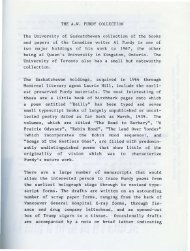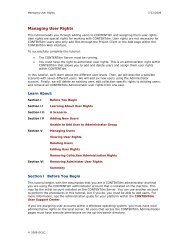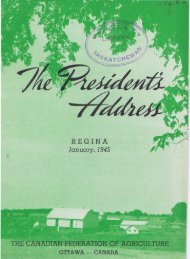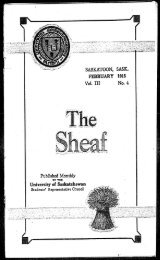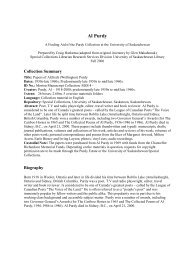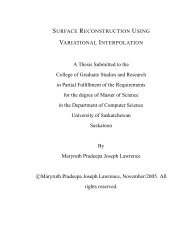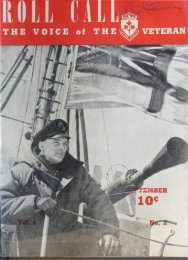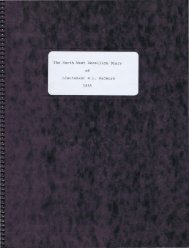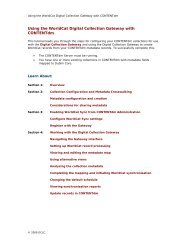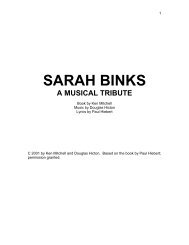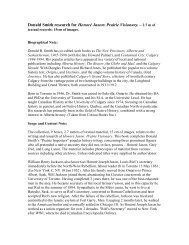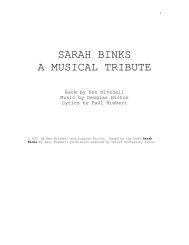Create successful ePaper yourself
Turn your PDF publications into a flip-book with our unique Google optimized e-Paper software.
1<br />
<strong>SARAH</strong> <strong>BINKS</strong><br />
A <strong>MUSICAL</strong> <strong>TRIBUTE</strong><br />
Book by Ken Mitchell<br />
Music by Douglas Hicton<br />
Lyrics by Paul Hiebert<br />
C 2001 by Ken Mitchell and Douglas Hicton. Based on the book Sarah<br />
Binks by Paul Hiebert; permission granted by Oxford University Press.
2<br />
PLACE: A meeting of the Sarah Binks Memorial Society (in Willows).<br />
CHARACTERS:<br />
PAUL HIEBERT, the author and noted biographer.<br />
<strong>SARAH</strong> <strong>BINKS</strong>, a dead poet. Sensitive but of limited education.<br />
TWO SINGERS(BASS & ALTO)who play the other characters, male and female.<br />
MUSIC I:2 "HIEBERT'S ENTRANCE"<br />
(HIEBERT APPEARS. AUDIENCE APPLAUSE.)<br />
HIEBERT: Welcome to this assembly of the Sarah Binks Memorial<br />
Society. Tonight we are marking the 50th anniversary of the great<br />
Sarah’s passing to a higher realm.<br />
AUDIENCE:<br />
Hear, hear.<br />
HIEBERT: A few of you probably knew The Sweet Songstress of<br />
Saskatchewan personally. Others have been drawn here tonight by the<br />
fame of her legendary pen. As her biographer, I only claim a small part<br />
in the growing pinnacle of her reputation. (Copies of my book may be<br />
purchased at the conclusion of my talk.) You know something about her<br />
life -- you know of her tragic death. You have read about the honours<br />
she received, including that highest award in the treasury of prairie<br />
culture, the Wheat Pool Medal. But the question remains. What produced<br />
this rare flowering of literary genius -- perhaps second only to the<br />
great Shakespeare That is the question I as the biographer must<br />
answer.<br />
(MUSIC ENDS)<br />
HIEBERT:<br />
dirt farm.<br />
MUSIC I:3<br />
It is a long way from Stratford upon Avon to a Saskatchewan<br />
"THE FARMER IS KING"<br />
HIEBERT: But the language that inspired England's greatest bard, also<br />
inspired Sarah. When Sarah crooned euphorically about her stretch of<br />
gumbo, she sang for the entire Canadian West. For example, her poetic<br />
gem, "The Farmer is King". I have taken the liberty of setting it to<br />
music:<br />
(SINGS)<br />
THE FARMER IS KING OF HIS PACKER AND PLOUGH,<br />
OF HIS HARROWS AND BINDERS AND BREAKERS,<br />
HE IS LORD OF THE PIG AND CZAR OF THE COW<br />
ON HIS HUNDRED AND SIXTY-ODD ACRES!<br />
THE FARMER IS MONARCH IN HIGH ESTATE,<br />
OF HIS BARN AND HIS BACKHOUSE AND BYRE,<br />
OF ALL THE BUILDINGS BEHIND THE GATE<br />
AND HIS TWO-ODD MILES OF BARBED WIRE.<br />
THE FARMER IS EVEN CAESAR OF FREIGHT<br />
AND TARIFF AND TAX, COMES ELECTION,<br />
AND FROM THEN UNTIL THEN HE CAN ABDICATE,<br />
AND BE KING ON HIS OWN QUARTER SECTION.<br />
Sarah was born in the early years of Saskatchewan, in the halcyon<br />
days of the Golden West. The agricultural prosperity naturally produced
3<br />
an artistic flowering as well, and Sarah expressed its artistic soul.<br />
Her love for the alkaline soil was deep, and every spring, she spread<br />
her poetic fertilizer with a lavish hand. Here is a slide of Sarah at<br />
the age of ten.<br />
(PROJECTOR IMAGE OF <strong>SARAH</strong>, SPREADING FERTILIZER)<br />
(Sarah Theme, “Ode to Spring” Or "Calf")<br />
HIEBERT: There she stands at her father’s gate. Unschooled and<br />
unspoiled, this simple farm girl captured the flatness of her native<br />
landscape, its wildlife, the richness of its insect population. Like a<br />
sylph she wandered through the coulees and gopher meadows, in a divine<br />
frenzy. You can almost her voice now, crooning with delight.<br />
<strong>SARAH</strong> (GHOSTLY):<br />
You do hear me, Mr. Hiebert.<br />
HIEBERT:<br />
<strong>SARAH</strong>:<br />
HIEBERT:<br />
<strong>SARAH</strong>:<br />
What Sara, is that you<br />
Yes, it’s me. I'm here to correct some of your lies.<br />
What do you mean, lies<br />
Well, about Henry Welkin for one thing.<br />
HIEBERT: Of course, I'd be delighted to take your corrections for the<br />
record. As your humble biographer, I am only here to tell these people<br />
how you transcended the soil of Willows, Saskatchewan. Let us start in<br />
Willows. How would -- you describe it<br />
<strong>SARAH</strong>: That's not hard. It's a place halfway between Oak Bluff and<br />
Quagmire. What else do they want to know<br />
HIEBERT: Well – Its appearance perhaps. I described its civic<br />
architecture as unpretentious. A post office and a one-room school.<br />
<strong>SARAH</strong>: How about Charley Wong's restaurant and billiard parlour It<br />
was real pretentious! Plus a feed store, and four gas stations! It<br />
wasn't some hick village, like you wrote in your book!<br />
HIEBERT:<br />
<strong>SARAH</strong>:<br />
You read my book<br />
I glanced it over. I get around, now that I'm a spirit.<br />
HIEBERT: Of course, the town is now sadly declined -- eclipsed by its<br />
glorious past. Yet to this shrine every year come members of the Binks<br />
Memorial Society who pause for refreshment at the Clarendon Hotel, or<br />
fill up with gas at the "Sarah Binks Esso station."<br />
<strong>SARAH</strong>: Actually, I never spent a lot of time in Willows myself. I<br />
liked it better on the farm. Dad's place was ten miles outta town, out<br />
where the hand of man hath never trod.<br />
HIEBERT:<br />
By all means, then, let us begin at the farm!<br />
(PROJECTOR SHOWS HOUSE.)<br />
HIEBERT: The house has long since been vandalized by reckless<br />
souvenir hunters, and the barn is about to collapse. Gophers now frolic<br />
in the corral where Sarah raised her famous calf, not far from the<br />
slough where the mudhen builds its airy nest and the pensive mosquito<br />
wanders unafraid.
4<br />
(<strong>SARAH</strong> SLAPS HER ARM.)<br />
<strong>SARAH</strong>:<br />
Got him.<br />
HIEBERT: Here Jacob Binks built his sod hut, and later covered it<br />
with quality tar-paper. Guests entered through this “back porch," a<br />
small antechamber where coal was stored, along with winter potatoes and<br />
the cream separator.<br />
<strong>SARAH</strong>:<br />
And the busted harness.<br />
HIEBERT: Here the chickens were plucked, and the eggs cleaned. Here<br />
slept Rover, the Dog.<br />
<strong>SARAH</strong>:<br />
And Ole, the hired man.<br />
(SOUND OF OLE, SNORING.)<br />
HIEBERT:<br />
<strong>SARAH</strong>:<br />
his socks.<br />
Ole slept in the porch<br />
Ma insisted. But it wasn't 'cause he was Swedish. It was<br />
HIEBERT: Stepping into the kitchen, we see the very wall on which she<br />
wrote her early poems. The poem "Calf" for example, one of her finest<br />
odes.<br />
(PROJECTOR SHOWS CALF. <strong>SARAH</strong> BEGINS TO WEEP.)<br />
MUSIC I:4<br />
<strong>SARAH</strong>:<br />
"OH, CALF"<br />
That was my calf Barnaby. He died two days later.<br />
HIEBERT: Could you recite it The entire society would love to hear<br />
you render those haunting words.<br />
<strong>SARAH</strong>:<br />
I can sure as heck try! Just give me a sec.<br />
(<strong>SARAH</strong> POSITIONS HERSELF BRAVELY.)<br />
<strong>SARAH</strong>:<br />
OH, CALF, THAT GAMBOLLED BY MY DOOR,<br />
WHO MADE ME RICH, WHO NOW AM POOR,<br />
THAT LICKED MY HAND, MY HAND WITH MILK BESPREAD,<br />
HIEBERT AND <strong>SARAH</strong>: OH CALF, CALF! ART DEAD, ART DEAD<br />
<strong>SARAH</strong>:<br />
OH CALF, I SIT AND LANGUISH, CALF,<br />
WITH SOMBER FACE, I CANNOT LAUGH,<br />
CAN I FORGET THY PLAYFUL BUNTS<br />
HIEBERT AND <strong>SARAH</strong>: OH CALF, CALF, THAT LOVED ME/HER ONCE!<br />
<strong>SARAH</strong>:<br />
WITH MILDEWED OPTICS, DEATHLIKE, STILL,<br />
MY NIGHTS ARE DAMP, MY DAYS ARE CHILL,<br />
I WEEP, I WEEP AGAIN WITH DOLEFUL SNIFF,<br />
HIEBERT AND <strong>SARAH</strong>: OH CALF, CALF, CAAAAAAALF,<br />
OH CALF, CALF, SO DEAD, SO STIFF.<br />
(<strong>SARAH</strong> AND HIEBERT HONK INTO THEIR HANKIES.)
5<br />
HIEBERT:<br />
<strong>SARAH</strong>:<br />
HIEBERT:<br />
Sarah learned early about the tragic reality of nature.<br />
Yeah. I had to weed the garden and pick tater bugs!<br />
But somehow she plodded on with her schooling.<br />
<strong>SARAH</strong>: Well, I only got to school once a week or so. Had to help<br />
Dad with the farm, you see.<br />
HIEBERT: He was opposed to your schooling But wasn't he the<br />
chairman of the Willows School Board<br />
<strong>SARAH</strong>: He didn't believe in “book learning”. So they elected him<br />
every year, like clockwork.<br />
HIEBERT: Just like Shakespeare's father! All the more important that<br />
you took lessons in the school of nature. (TO AUDIENCE) To Sarah,<br />
nature was something alive. Give her a dead field mouse, a crocus, or a<br />
jam pail full of sowbugs, and poetry gushed forth unbidden, unrestrained<br />
and uncalled for.<br />
MUSIC I:5<br />
"THE GENIUS"<br />
HIEBERT: As she reveals in her little poetic gem, "The Genius" --<br />
composed at the age of 12.<br />
<strong>SARAH</strong>:<br />
I'M A GENIUS, I'M A GENIUS,<br />
WHAT MORE CAN I DESIRE<br />
I TOOT UPON MY LITTLE FLUTE,<br />
AND TWANG UPON MY LYRE;<br />
I DABBLE IN OIL PAINT<br />
IN CINNEBAR AND OCHRE,<br />
ALL NIGHT I AM DISSIPATED,<br />
AND PLAY POKER.<br />
IN MY LITTLE BOOK, IN MY LITTLE BOOK<br />
I WRITE VERSES,<br />
SOMETIMES THEY DON'T RHYME --<br />
CURSES!<br />
HIEBERT: Sarah's formal education may have been scant, but she never<br />
let that go to her head. And there were many other influences on<br />
Sarah's early work. There was Rover, the dog, Ole the Hired Man,<br />
Mathilda Schwantzhacker. And of course Henry Welkin.<br />
<strong>SARAH</strong>:<br />
Henry Welkin More lies. We're not talking about him!<br />
HIEBERT: Well, a little later, perhaps --<br />
<strong>SARAH</strong>: If you’re interested in where I got my philosophy, we can<br />
talk about my father, Jacob Binks.<br />
HIEBERT:<br />
Very well. Jacob Binks.<br />
(PROJECTOR SHOWS JACOB <strong>BINKS</strong>.)<br />
HIEBERT: Sarah was the second or possibly the third child of Jacob<br />
and Agathea Binks, though none of the other children survived their
6<br />
infancy, and Agathea Binks apparently abdicated while Sarah was still a<br />
child. She was raised by her father, who taught her the meaning of work!<br />
MUSIC II:16 "SONG OF THE CHORE"<br />
<strong>SARAH</strong>:<br />
I SING THE SONG OF THE SIMPLE CHORE,<br />
OF QUITTING THE DOWNY BED AT FOUR,<br />
AND CHIPPING ICE FROM THE STABLE DOOR --<br />
OF THE SIMPLE CHORE I SING:<br />
TO THE FORTY BELOW AT BREAK OF DAY,<br />
TO CLIMBING UP, AND THROWING DOWN HAY,<br />
TO CLEANING OUT AND CARTING AWAY,<br />
A PAEAN OF PRAISE I BRING.<br />
OH, IT'S TIME TO MILK<br />
OR IT'S TIME TO NOT,<br />
OH, IT'S TIME FOR BREAKFAST<br />
AND TIME I GOT<br />
THE POT OF COFFEE<br />
IN THE COFFEE POT --<br />
I SING OF THE CHORE, "HURRAY"!<br />
<strong>SARAH</strong>:<br />
OTHERS:<br />
<strong>SARAH</strong>:<br />
OTHERS:<br />
OH, IT'S TIME FOR THIS AND IT'S TIME FOR THAT,<br />
OH, IT'S TIME FOR THIS AND IT'S TIME FOR THAT,<br />
FOR MENDING UNENDING AND TENDING THE BRAT,<br />
FOR MENDING UNENDING AND TENDING THE BRAT,<br />
ALL (in a round): AND IT'S TIME TO TURN IN AND PUT OUT THE CAT,<br />
TOMORROW'S ANOTHER DAY.<br />
HIEBERT: But Professor H.P. Marrowfat's crude suggestion that your<br />
father wrote your early poems surely does not bear critical scrutiny.<br />
Jacob was an unlettered man.<br />
<strong>SARAH</strong>:<br />
Oh no, he got lots of letters.<br />
HIEBERT: And after you became famous, I believe he was presented as a<br />
candidate for election by the Quagmire-Willows Conservative Association<br />
<strong>SARAH</strong>:<br />
Yeah, but he was dead then.<br />
HIEBERT: Still, in the poem "Crisscrossers", Sarah demonstrates her<br />
skill in philosophy, showing unmistakable echoes of the senior Binks.<br />
MUSIC I:8<br />
JACOB:<br />
"CRISSCROSSERS"<br />
MY DAUGHTER, IF YOU CHANCE TO MEET<br />
WITH HIM WHO WALKS WITH CRISS-CROSS FEET,<br />
GO MARK HIM WELL, WITHIN THAT BRAIN<br />
ARE SEETHING THOUGHTS THAT NONE CAN NAME.<br />
JACOB AND HIEBERT:<br />
GO MARK HIM WELL,<br />
AND WALK BEHIND,<br />
HIS GAIT BESPEAKS THE COSMIC MIND.<br />
GO MARK HIM WELL, AND WALK BEHIND --
7<br />
HIS GAIT BESPEAKS THE COSMIC MIND.<br />
YOUNG <strong>SARAH</strong>:<br />
O DAD, SUCH MAN ALONG THE STREET,<br />
WITH GLOWING ORBS AND CRISS-CROSS FEET,<br />
WHO BREATHES A GREAT HILARITY,<br />
(CRISSCROSSERS ARE A RARITY),<br />
HAS FOUND IN THAT CEREBRAL BALL<br />
THE FINAL MEANING OF IT ALL.<br />
HIEBERT:<br />
MY GIRL, SUCH MAN WITH MIND ALOOF,<br />
IS WORTH TEN OTHERS ON THE HOOF,<br />
AND HE WHO WALKS WITH CRISS-CROSS GAIT<br />
CAN READ THE COSMOS LIKE A SLATE.<br />
JACOB, YOUNG <strong>SARAH</strong> & HIEBERT: GO MARK HIM WELL<br />
WITH HUMBLE HEART.<br />
CRISSCROSSERS ARE A THING APART.<br />
GO MARK HIM WELL WITH HUMBLE HEART.<br />
CRISSCROSSERS ARE A THING APART!<br />
CRISSCROSSERS ARE A THING APART!<br />
HIEBERT: "To read the cosmos like a slate"! Jacob Binks had been a<br />
crisscrosser on many occasions, indeed after most political meetings,<br />
when he practised the crisscross on his way home from town. Inspired by<br />
his example, Ole made several attempts to achieve the "cosmic mind," but<br />
never succeeded.<br />
<strong>SARAH</strong>:<br />
Ole's contribution wasn't really what you'd call mental.<br />
HIEBERT: No. But to Ole the hired man, big of heart and big of feet,<br />
must go the credit for inspiring some of Sarah's early work. He was a<br />
big man, with hands that swung at his sides like slabs of teak. He had<br />
shoulders of gnarled oak.<br />
<strong>SARAH</strong>:<br />
And a head to match.<br />
HIEBERT: In "Steeds," the Swede's natural enthusiasm is combined with<br />
the magnificent rhythm of galloping horses.<br />
MUSIC I:10 "STEEDS"<br />
HIEBERT: The poem is set in the late afternoon of election day, 1911,<br />
when Ole disappeared with two gallons of horse-medicine he was<br />
transporting to the Conservative committee rooms.<br />
OLE:<br />
I HAVE TWO DASHING, PRANCING STEEDS,<br />
BUTTERCUP AND DAIRY QUEEN,<br />
WHAT FOR SPIRIT, WHAT FOR SPEED,<br />
MATCHES THIS AMAZING TEAM<br />
WHEN THEY'RE FASTENED SIDE BY SIDE,<br />
YOKED TOGETHER IN THE TRACES,<br />
JOYFULLY PREPARE TO RIDE<br />
O'ER THE BIG AND OPEN SPACES;<br />
ALL:<br />
OLE:<br />
ALTO:<br />
WHOOPEE! SWIFT ACROSS THE STUBBLE,<br />
OVER SHOULDERS, BANKS AND RUBBLE,<br />
UP THE HILL AND DOWN THE GLEN,<br />
CROSS THE COUNTRY -- BACK AGAIN,
8<br />
HIEBERT:<br />
<strong>SARAH</strong>:<br />
OLE:<br />
ALTO:<br />
HIEBERT:<br />
THROUGH THE FENCE AND GREENHOUSE GO,<br />
PUMPKIN GARDEN -- TO AND FRO,<br />
POUNDING, PUFFING, LIKE A DRAGON,<br />
KILL THE CALF AND SMASH THE WAGON,<br />
THROUGH THE HAYLOFT, DUST AND SMOTHER,<br />
<strong>SARAH</strong>: IN ONE END AND OUT THE OTHER --<br />
ALL:<br />
ZOWIE! WHEN THEIR SPIRIT'S UP!<br />
DAIRY QUEEN AND BUTTERCUP!<br />
HIEBERT: More philosophical is the short poem, "The Cursed Duck", in<br />
which Sarah reveals her deep compassion, following the loss of one of<br />
Ole's ears. The Binks ducks had a taste for vegetables and we deduce<br />
from this ballad that Ole inadvertently fell asleep in, or near, the<br />
vegetable patch the night before.<br />
MUSIC I:11 "THE CURSED DUCK"<br />
<strong>SARAH</strong>:<br />
OLE:<br />
<strong>SARAH</strong>:<br />
<strong>SARAH</strong>:<br />
A CURSED DUCK PECKED OFF HIS EAR,<br />
AND HIS FACE GREW PEAKED AND PALE;<br />
"OH, HOW CAN A WOMAN LOVE ME NOW"<br />
WAS HIS CONSTANT AND LONELY WAIL.<br />
BUT A WOMAN CAME, AND SHE LOVED THE MAN,<br />
WITH A LOVE SERENE AND CLEAR.<br />
SHE LOVED HIM AS ONLY A WOMAN CAN LOVE --<br />
A MAN WITH ONLY ONE EAR.<br />
HIEBERT: Thus Sarah introduced the buxom figure of her friend<br />
Mathilda Schwantzhacker.<br />
MUSIC I:12 "MATHILDA 1" (very short)<br />
HIEBERT: Much has been written about Sarah’s friendship with this<br />
older girl from the neighboring farm who became a role model for Sarah's<br />
romantic poems. It was sparked of course by her interest in the Swedish<br />
hired man. Famous for his strength, Ole was able to toss Mathilda to<br />
the hayloft with ease, though she was eighteen and ample for her age.<br />
<strong>SARAH</strong>: Oh, the games she played with Ole! "Auntie, Auntie up!" they<br />
cried, or "Catch-me-if-you-can" as they chased between the barn and the<br />
buggy shed on Sunday afternoons.<br />
HIEBERT: Sarah found their courtship a source of great amusement, and<br />
pursued this romantic motif. The field of feminist criticism must<br />
acknowledge a great debt to these pioneer women, for without Mathilda's<br />
romantic initiative, the great Gryczlkaeiouc (pron. Gritchelkay'uke)<br />
symphony would never have been composed.<br />
MUSIC I:13 "OLE AND MATHILDA"
9<br />
<strong>SARAH</strong>: Mathilda lived half a mile down the road, the eldest of<br />
thirteen Schwantzhacker girls. They came trooping over to entertain Ole<br />
every time at least once a day.<br />
HIEBERT: Ole was always deeply moved by the dramatic spectacle of<br />
thirteen Schwantzhackers picking their way through the cow pasture. But<br />
he and Sarah preferred Mathilda's company. She was the most intelligent.<br />
<strong>SARAH</strong>:<br />
HIEBERT:<br />
Or the least cross-eyed.<br />
And the only one with an ear for the Orphic muse.<br />
(MUSIC SEGUES TO:)<br />
MUSIC I:14 "WHERE SHALL I FIND A HIRED MAN"<br />
HIEBERT: At Mathilda's request, Sarah composed this splendid tribute to<br />
Ole's manhood, "Where Shall I Find a Hired Man"<br />
(<strong>SARAH</strong> HANDS MATHILDA A SHEET OF PAPER.)<br />
MATHILDA:<br />
WHERE SHALL I FIND A HIRED MAN<br />
FOR HOMELY DESTINY TO TOIL,<br />
TO MEND HARNESSES,<br />
AND SHOVEL CEMENT,<br />
AND BOIL OIL.<br />
WHERE SHALL I FIND A HIRED MAN<br />
TO GATHER ROCKS AND DO THE CHORES,<br />
TO HARROW WIDE,<br />
AND PLOW DEEP,<br />
THE BIG OUTDOORS.<br />
WHERE SHALL I FIND A HIRED MAN<br />
WITH A SINGLE PASSION FOR HIS JOB,<br />
WITH THOUGHTS OF WORK,<br />
AND NOTHING ELSE,<br />
WITHIN HIS KNOB.<br />
WHERE SHALL I SEARCH FOR A HIRED MAN<br />
WITH CORDED ARMS AND KNOTTED KNEES,<br />
WITH BEAMED SHOULDERS,<br />
AND FEET LIKE HERCULES'<br />
<strong>SARAH</strong>: Ole could certainly cause a stir. Then the war came, and he<br />
took off to join the Canadian army. That was the last we seen of him.<br />
HIEBERT: The Ladies Literary League of Quagmire later conducted a<br />
raffle so this poem could be carved upon Ole's tombstone, wherever it<br />
might be found. In moving the motion, Mrs. Pete Cattalo said...<br />
CATTALO: "It is a big poem. But then Ole was a big man, big in every<br />
way, take it from me."<br />
<strong>SARAH</strong>: Mathilda was a total wreck for a long time after he left.<br />
It was especially hard on her because he'd gone to fight the Huns.<br />
HIEBERT:<br />
And the Schwantzhackers were German<br />
<strong>SARAH</strong>: Exactly. That's when Mathilda asked me to start translating<br />
poems from German.
10<br />
HIEBERT: Mathilda apparently sought comfort in the literature of her<br />
fatherland, and introduced it to Sarah, with the help of the family<br />
dictionary.<br />
MUSIC I:15 "THE LAUREL'S EGG"<br />
HIEBERT: In grief at Ole's disappearance in Flanders, they translated<br />
several songs from deutsche, including the famous "Die Lorelei".<br />
<strong>SARAH</strong>:<br />
I KNOW NOT WHAT SHALL IT BETOKEN,<br />
THAT I SO SORROWFUL SEEM,<br />
A MARKLET FROM OUT OF OLD, SPOKEN,<br />
THAT COMES ME NOT OUT OF THE BEAN,<br />
THAT COMES ME NOT OUT OF THE BEAN.<br />
THE LOFT IS COOL AND IT DARKLES,<br />
AND RUEFULLY FLOWETH THE CLEAN,<br />
THE TOP OF THE MOUNTAIN-TOP SPARKLES,<br />
IN EVENING SUN-SHINE SHEEN,<br />
IN EVENING SUN-SHINE SHEEN.<br />
THE FAIREST YOUNG WOMAN SITTETH,<br />
THERE WONDERFUL UP ON TOP,<br />
HER GOLDEN-LIKE OUTFIT GLITTETH,<br />
SHE COMBETH HER GOLDEN MOP;<br />
SHE COMBS IT WITH GOLDEN COMB-FULL<br />
AND SINGS ONE SONG THERETO,<br />
THAT HAS ONE WONDERFUL, WONDERFUL,<br />
AND POWERFUL TOODLE-DI-DOO.<br />
(cadenza) AHHH --<br />
I BELIEVE THAT THE WHALES WILL DEVOUR<br />
THE END OF THE SHIPPER AND SHIP,<br />
AND THAT HAS IN HER SINGING BOWER,<br />
THE LAUREL'S EGG DONE IT,<br />
THE LAUREL'S EGG DONE IT.<br />
HIEBERT: Sarah's interpreting the river Rhein as the River "Clean" is<br />
masterful, despite the slight error in translating Die Lorelie as "The<br />
Laurel's Egg". Translation was not her forte of course, and it is now<br />
fashionable to dismiss Sarah's translations, as unworthy expressions of<br />
Saskatchewan culture. On the contrary, I say. It is the poet’s duty to<br />
speak in a multicultural babble, the true language of the prairies.<br />
But I digress. Sarah's experiments with the German language put her<br />
under a cloud of patriotic suspicion, and she received an unexpected<br />
visit from the RCMP. Appalled by the suggestion that she could be<br />
unpatriotic, and to prove her love of country, she sat down and dashed<br />
off her great hymn of heroic sacrifice - inspired by her friend Ole, now<br />
lost forever in the fields of Flanders.<br />
MUSIC I:17 "FREEDOM"<br />
HIEBERT, OLE, <strong>SARAH</strong> AND MATHILDA:<br />
SHALL FREEDOM SHRIEK AGAIN,<br />
SHALL FREEDOM WAIL,<br />
OR STAND AT LAST, AGHAST,<br />
WITH UNFURLED TAIL,
11<br />
SHALL IT BENEATH THE IRON<br />
TYRANT'S GUM-SHOE QUAIL<br />
NAY! NOT WHILE YET IS LEFT<br />
THE WIND WHEREWITH TO SOUND<br />
THE BAGPIPE, NOT WHILE YET IS LEFT<br />
THE STICK WHEREWITH TO POUND<br />
THE SNARE-DRUM, NOT WHILE YET THE BLOOD<br />
OF CHRISTOPHER COLUMBUS<br />
FLOWS IN OUR VEINS,<br />
SHALL THESE, OUR FOES, SUCCUMB US.<br />
HIEBERT: In her very next effort, Sarah shook off the cloud of<br />
suspicion that her work had attracted, and wrote what most critics agree<br />
was her finest work, "Ode to Spring".<br />
MUSIC I:18 "ODE TO SPRING"<br />
HIEBERT: Hearken to Sarah, full-throated in the orgasmic euphoria of<br />
Saskatchewan's favourite season:<br />
<strong>SARAH</strong>:<br />
ALL:<br />
'TIS NOT FOR LONG THE BIRD SHALL CREEP<br />
BENEATH A PILE OF MOULDY STRAW;<br />
EFTSOONS, NOT LONG THE CHILL WINDS SWEEP,<br />
AND POWDERED SNOW-BANKS FOUR FEET DEEP,<br />
PILE UP, PILE UP, IN ROUNDISH HEAP,<br />
PILE UP, PILE UP, IN ROUNDISH HEAP:<br />
FOR SPRING IS COMING WITH ITS MIRTH,<br />
AND BREEZY BREATH OF BALMY WARMTH,<br />
AND BURBANK, BOBOLINK, AND SNEARTH<br />
SHALL BANISH WINTER'S CHILL AND DEARTH,<br />
AND LUSCIOUS JOY SHALL FILL THE EARTH,<br />
AND LUSCIOUS JOY SHALL FILL THE EARTH.<br />
HIEBERT: 'Ode to Spring' caused a furor when it appeared in The<br />
Horse-Breeder's Gazette. It struck a deep chord in the hearts of<br />
prairie folk. They had suffered a miserable winter. The roads were<br />
blocked, and temperatures were still at thirty-eight to forty-five below<br />
zero. Suddenly the voice of Sarah, The Sweet Songstress, burst upon<br />
them like a Madrigal of cheer. Spring was coming; the burbank and the<br />
snearth were imminent. No wonder Saskatchewan took her to its broad,<br />
flat bosom! Sarah awoke to find herself a local celebrity.<br />
MUSIC I:19: "SONG TO THE COW / THE GOOSE"<br />
HIEBERT: She immediately wrote "Song to the Cow" and "The Goose,"<br />
both of which reveal a deep love for the bucolic life.<br />
<strong>SARAH</strong>:<br />
I'LL TAKE NO COW THAT FAILS TO SING<br />
OR THROSTLE WITH ITS HORN,<br />
HER MILK MUST STIMULATE LIKE TEA,<br />
HER TAIL STRETCH TO INFINITY,<br />
AND HER NOSE BE PLUSH AND WARM.<br />
AMOROUS OF OPTIC, MILD BUT QUICK<br />
TO PERCEIVE WHERE THE GRASS IS PALE,<br />
A RHOMBOID SNOUT, A MELLOW LICK,<br />
AND A BREATH LIKE ALE --<br />
THESE AT<strong>TRIBUTE</strong>S IN A COW, I DEEM,<br />
ARE THE BEST TO BE HAD AND WIN MY ESTEEM.
12<br />
HIEBERT:<br />
THE GOOSE, A NOISOME BIRD TO CHATTER,<br />
BUT HANDSOME ON A GARNISHED PLATTER,<br />
A LOATHSOME BRUTE TO TOIL AMONG,<br />
BUT CAUGHT AND KILLED AND COOKED AND HUNG,<br />
BEFORE A CRACKLING FIRE,<br />
A SONGSTER TO ADMIRE.<br />
HIEBERT: Upon completing this tribute to the Binks animals, the<br />
poetess began her greatest work, the suite of poems called the<br />
Gryczlkaeiouc (pron. Gritchelkay'uke) Symphony. In this, she<br />
immortalized the last great love affair of her confidante, Mathilda.<br />
MUSIC I:20 "MATHILDA 2" (very short)<br />
HIEBERT: Mathilda Schwantzhacker was an unlikely muse for a daughter<br />
of Orpheus. But it is possible Sarah knew more about Mathilda than<br />
Mathilda knew.<br />
<strong>SARAH</strong>:<br />
More than she suspected, anyhow. And my mouth is sealed.<br />
HIEBERT: But we need such biographical detail to appreciate the<br />
complexities of the Gryczlkaeiouc Symphony.<br />
<strong>SARAH</strong>: That's, uh, Grizzlykick.<br />
HIEBERT: Pardon<br />
<strong>SARAH</strong>: Her boy friend's name was Stem Grizzlykick.<br />
HIEBERT: Ah - local dialect. Grizzlykick!<br />
(PROJECTOR SHOWS STEM, A ROUGH FARMER.)<br />
HIEBERT: Mathilda's most ardent admirer was one Stemka<br />
Gryczlkaeiouc... uh Grizzlykick..., known in the community, at least in<br />
the hotel, as "Stem."<br />
<strong>SARAH</strong>:<br />
Or "Steve" sometimes.<br />
HIEBERT: He was a farmer; and although he never raised a crop of<br />
wheat, his estate was abundant in barley and potatoes. These featured<br />
in the production of exotic beverages, a craft which allowed him to take<br />
up the joy of the hunt in the summer. Stem was a keen hunter, and a<br />
far-sighted conservationist. He rarely killed gophers except in selfdefence,<br />
and to sell their tails for the bounty. This provided him a<br />
steady income without depopulating the land. And Sarah was delighted<br />
now that her friend had fallen in love again, and hoped to get married!<br />
<strong>SARAH</strong>: Actually, it wasn't really love, and for a long time they<br />
weren't exactly married -- but it was all grist for my poetic mill.<br />
MUSIC I:22 "SEGUE MUSIC"<br />
HIEBERT: There is evidence that Stem had already observed Mathilda<br />
and admired her from afar. The poem, "Hi, Sooky, Ho, Sooky" exists only<br />
in Stem's cryptic holograph, but clearly composed in Sarah's inimitable<br />
style. The opening duet in the great symphony.<br />
(MUSIC SEGUES TO:)
13<br />
MUSIC I:23 "HI, SOOKY, HO, SOOKY"<br />
STEM:<br />
MATHILDA:<br />
STEM:<br />
BOTH:<br />
STEM:<br />
MATHILDA:<br />
STEM:<br />
BOTH:<br />
STEM:<br />
<strong>SARAH</strong>:<br />
COMPANY:<br />
OH, I HEARD YOUR VOICE AT DAYBREAK,<br />
CALLING LOUD AND SWEET AND CLEAR;<br />
I WAS HIDING IN THE TURNIPS<br />
WITH A CRICKET IN MY EAR;<br />
A MILLER-MOTH IN ONE EAR,<br />
AND A CRICKET IN THE OTHER,<br />
BUT I HEARD YOUR DEAR VOICE CALLING<br />
TO THE PIGLETS AND THEIR MOTHER;<br />
HEARD YOUR OWN VOICE RISING, FALLING,<br />
LOUD AND LONG, AND SHARP AND SHRILL,<br />
CALLING....<br />
SOOKY, SOOKY, SOOOOOOKY!<br />
TO THE PIGLETS ON THE HILL.<br />
HI, SOOKY, HO, SOOKY,<br />
COME AND GET YOUR SWILL!<br />
OH, I'VE HID AMONG THE TURNIPS<br />
AND I'VE HID BETWEEN THE STOOKS,<br />
WITH BARLEY BARBS ALL DOWN MY BACK,<br />
AND BEETLES IN MY BOOTS;<br />
BUT I'VE SEEN YOU IN THE DWINDLING,<br />
AND I'VE SEEN YOU IN THE RAIN,<br />
WITH AN ARMFUL FULL OF KINDLING,<br />
WHEN YOU FELL AND ROSE AGAIN;<br />
I'VE SEEN YOU PLODDING THROUGH THE DUST<br />
AND PLUGGING THROUGH THE WET,<br />
AND AT NIGHT AGAINST THE WINDOW-BLIND,<br />
I'VE SEEN YOUR SILHOUETTE;<br />
BUT...<br />
SOOKY, SOOKY, SOOOOOOKY!<br />
I NEVER CAN FORGET.<br />
HI, SOOKY, HO SOOKY,<br />
COME AND GET YOUR PEP!<br />
AND OH, I THINK I'LL HIDE AGAIN<br />
FOR JUST A SIGHT OF YOU,<br />
AND HEAR YOUR OWN SWEET VOICE AGAIN<br />
CALL...SOOKY, SOOKY, SOOOOOO!<br />
HI, SOOKY, HO, SOOKY,<br />
COME AND GET THE STEW, SOOKY,<br />
COME AND GET YOUR GOO, SOOKY,<br />
SOOKY, SOOKY, SOOOOOOOO!<br />
HIEBERT: And only two weeks after the publication of "Hi Sooky, Ho<br />
Sooky", Sarah wrote "The Plight." In this poem, Mathilda's adoration<br />
for uh, Grizzlykick is expressed through the symbolism of a tree. Trees<br />
were scarce around Willows, and tended to be small; in fact, the only<br />
tree between Willows and South Vigil -- undoubtedly the one in "The<br />
Plight" -- was so small that to find its shade was a task of some<br />
difficulty. The poem is doubly interesting therefore, as a botanical,<br />
as well as a lyrical, triumph.
14<br />
MUSIC I:24 "THE PLIGHT"<br />
<strong>SARAH</strong>:<br />
IS THIS THE TREE<br />
THAT SAW THEIR FIRST LOVE'S PLIGHTING,<br />
AND THOSE THE LEAVES<br />
THAT HEARD OUR FIRST LOVE'S VOW,<br />
AND YONDER LIMB<br />
THAT SAW LOVE'S FIRST DELIGHTING,<br />
IS THAT THE VERY LIMB, THE SELF-SAME BOUGH<br />
IS THIS ITS SCANTY SHADE<br />
WHERE LOVE FIRST HIT ME,<br />
AND CATERPILLARS TUMBLED FROM ON HIGH;<br />
IS YONDER ANT<br />
THE VERY ANT THAT BIT ME,<br />
AND THEM THE SAME MOSQUITOES IN THE SKY<br />
CAN THIS THEN BE<br />
THE TREE THAT SEEMED SO LEADEN,<br />
AND GREY AND DULL<br />
A SCANT FEW HOURS AGO<br />
NOW ALL IS CHANGED;<br />
ITS BRANCHES REACH TO HEAVEN,<br />
AND UP AND DOWN THE ANGEL ANTLETS GO;<br />
TIME CANNOT CHANGE, THOUGH LEAF<br />
AND TWIG MAY WITHER,<br />
AND CATERPILLAR STRUGGLE INTO MOTH.<br />
THIS IS THE TREE<br />
THAT HEARD LOVE'S FIRST SWEET BLITHER,<br />
THIS IS THE SPOT WE LOUDLY PLIGHTED TROTH.<br />
HIEBERT: The couple soon made their romance public when Stem invited<br />
his paramour to a dance at the Willows School house. Their enthusiasm is<br />
captured in Sarah's rousing poem, "The Square Dance".<br />
MUSIC I:21 "SQUARE DANCE"<br />
<strong>SARAH</strong>:<br />
HIEBERT:<br />
<strong>SARAH</strong>:<br />
HIEBERT:<br />
<strong>SARAH</strong>:<br />
HIEBERT:<br />
SING HO, FOR THE DANCE,<br />
TO SHUFFLE AND PRANCE,<br />
SING "LADIES, DO-SI-DO!"<br />
AND FIDDLES ENGAGE,<br />
WITH "BIRD-IN-THE-CAGE,"<br />
SING "ELEBEN-LEFT!" -- SING HO!<br />
GIVE ME THE SQUARE<br />
WHEN HARMONICAS BLARE,<br />
AND THE LADIES ARE SET FOR THE SWING --<br />
AND SQUIFFY MALARTY<br />
HAS MADE UP THE PARTY,<br />
WITH A HANDKERCHIEF TIED TO HIS WING:<br />
SWING OLGA, SWING LENA,<br />
SWING KATE AND KATRINA,<br />
SWING GUDRUN, AND BJORG AND GERTRUDE.<br />
SWING HEAVY, SWING HEARTY.<br />
SWING SQUIFFY MALARTY,
15<br />
<strong>SARAH</strong>:<br />
HIEBERT:<br />
MATHILDA:<br />
THE LIFE OF THE PARTY -- AND STEWED.<br />
GIVE ME THE DANCE,<br />
WHERE THE GIRLS TAKE A CHANCE,<br />
WITH SEAM AND WITH BUTTON AND STRING,<br />
AND SWING THEM UP HIGHER,<br />
BEFORE THEY RETIRE --<br />
SING HO, HEIGH-HO, FOR THE SWING;<br />
SING HO, FOR THE SWIRLS,<br />
AND THE BREATHLESS GIRLS,<br />
WITH THE SWIMMING DELIGHT IN THEIR EYES --<br />
COME SMALLER OR TALLER,<br />
TAKE OFF THE COLLAR --<br />
SING HO, FOR THE EXERCISE.<br />
SWING DAISY, SWING BETTY,<br />
STEM: SWING MAISIE AND LETTY,<br />
<strong>SARAH</strong>:<br />
MATHILDA:<br />
SWING MIRABEL, MARGIE AND JOY.<br />
SWING MRS. MCGINTY,<br />
STEM: SIX FEET AND SQUINTY,<br />
<strong>SARAH</strong>:<br />
ALL:<br />
TWO HUNDRED AND TWENTY -- AND COY.<br />
SING HO, FOR THE DANCE,<br />
TO SHUFFLE AND PRANCE,<br />
SING "LADIES, DO-SI-DO!"<br />
AND FIDDLES ENGAGE,<br />
WITH "BIRD-IN-THE-CAGE,"<br />
SING "ELEBEN-LEFT!"<br />
SING HO!<br />
HIEBERT: In "The Proposal," Sarah's next creation, we sense a<br />
cautious joy at the approaching nuptials. It seems that Stem needed a<br />
job to improve his standing, and appears here as the "hired man", not to<br />
be confused with the departed Ole.<br />
MUSIC I:25 "PROPOSAL"<br />
<strong>SARAH</strong>:<br />
STEM:<br />
<strong>SARAH</strong>:<br />
MATHIDA:<br />
<strong>SARAH</strong>:<br />
MATHILDA:<br />
THE HIRED MAN TO THE MAIDEN SPOKE:<br />
OH, MARRY ME TOMORROW,<br />
WE'LL FILL THE HEATER UP WITH COKE,<br />
KETTLE, BEANS, AND BACON BORROW,<br />
MAKE A TABLE, BUILD A BED --<br />
WHY SO HAPPY WHEN WE'RE WED<br />
HAPPY, HAPPY, WHILE WE CAN,"<br />
TO THE MAID THE HIRED MAN.<br />
"OH NOT SO FAST,"<br />
THE MAID REPLIED.<br />
"IN THIS I AM IMMUTABLE.<br />
I FEAR YOUR LOVE WOULD WEAKEN,<br />
THOUGH YOUR ARDOUR'S INDISPUTABLE;
16<br />
LOVE MAY WANE AND LOVE MAY WAX,<br />
MINE CAN ONLY THRIVE ON FACTS.<br />
WORK A YEAR AND WE SHALL SEE,"<br />
<strong>SARAH</strong>:<br />
CRIED THE MAIDEN MODESTLY.<br />
HIEBERT: The path of true love was beginning to deviate. Perhaps it<br />
was not the season for consummation; perhaps the inconstant lover<br />
induced coyness in the otherwise enthusiastic Mathilda Schwantzhacker.<br />
MUSIC I:26 "MATHILDA 3" (very short)<br />
HIEBERT: After a long winter of silence in Sarah's work, spring<br />
brought forth a new movement in her great classic of courtship. For<br />
sheer saccharine elegance, few poems in the entire Symphony approach<br />
that universal favourite, "The Wedding Dress." Mathilda was assembling<br />
her trousseau and had just ordered a gown from the Eaton's catalogue.<br />
MUSIC I:27 "THE WEDDING DRESS"<br />
MATHILDA:<br />
<strong>SARAH</strong>:<br />
MATHILDA:<br />
ON PAGE TWO HUNDRED AND SIXTY-THREE,<br />
OH, THERE'S THE VERY DRESS FOR ME,<br />
THE PRICE IS RIGHT,<br />
THE SIZE IS TIGHT,<br />
THE COLOUR RED, AND GREEN, AND WHITE,<br />
AND I'LL BE CHICK, I'LL BE PETITE,<br />
OH, THAT'S THE DRESS FOR ME!<br />
THEY SAY THAT MAN WANTS LITTLE HERE,<br />
NOR WANTS THAT LITTLE LONG -- NOR DEAR,<br />
AND SO I SAY<br />
ON WEDDING DAY<br />
A DRESS THAT'S SHORT, AND CUTE, AND GAY,<br />
AND LIGHT ENOUGH FOR THE BREEZE TO PLAY,<br />
AND A SPECIAL PRICE -<br />
<strong>SARAH</strong>:<br />
"TO CLEAR."<br />
THOUGH AFTER WEDDING DAY WE FIND<br />
IT'S SHORT IN FRONT AND LONG BEHIND,<br />
AND WINDS ON HEATH<br />
GET UNDERNEATH,<br />
AND RATTLE BONES, AND RIBS, AND TEETH,<br />
FOR WEDDING DAY WITH WEDDING WREATH<br />
I WANT TO LOOK REFINED.<br />
HIEBERT: The joy of matrimony, however, was again delayed for this<br />
modern Heloise and Abelard. After several postponements, due to Stem's<br />
preparation of the potato champagne for the nuptials, the knot was tied.<br />
As evidence, we have Sarah's later poem, "Lullaby," the next movement in<br />
the Grizzlykick Symphony.<br />
MUSIC I:28 "LULLABY"<br />
(THIS SONG REALLY SHOULD BE SUNG BY MATHILDA, BUT)<br />
<strong>SARAH</strong>:<br />
SLEEP, MY DARLING, SLEEP AWAY,<br />
DADDY'S GONE TO TOWN WITH HAY,
17<br />
AND AT FOUR O'CLOCK WILL COME<br />
THE MAN WHO SELLS ALUMINUM;<br />
MOTHER'S SOLD ON KITCHEN WARE,<br />
SLEEP, SHE WANTS TO DO HER HAIR.<br />
THOUGH YOU'RE FAR TOO YOUNG FOR TELLING,<br />
MOTHER DOESN'T WANT YOU YELLING<br />
WHEN THE SALES MAN COMES -- SO YOU<br />
SLEEP TILL FIVE OR QUARTER TO.<br />
(HIEBERT AND MATHILDA HUM ALONG)<br />
<strong>SARAH</strong>:<br />
BABY:<br />
SLEEP, MY PRECIOUS, CLOSE YOUR EYES,<br />
MOTHER'S SOLD ON PLATES FOR PIES,<br />
AND TOMORROW --<br />
WAAAAH!<br />
<strong>SARAH</strong>: GO TO SLEEP --<br />
DADDY GOES TO TOWN WITH SHEEP,<br />
BETTER COUNT THEM WHILE YOU'RE ABLE,<br />
WHEN THEY'RE GONE THEY'LL LOCK THE STABLE,<br />
SO WE'LL COUNT THEM, YOU AND ME,<br />
FOUR O'CLOCK COMES AFTER THREE.<br />
COUNT THE HOURS, COUNT THE SHEEP.<br />
HMS:<br />
SLEEP, YOU LITTLE NUISANCE, SLEEP.<br />
HIEBERT: More than their personal life, however, it was their<br />
professional life as farmers that Sarah vowed to celebrate in this<br />
romance. Hence, "Song to the Four Seasons".<br />
MUSIC II:2 "SONG TO THE FOUR SEASONS"<br />
(LIGHTS COME UP ON MATHILDA AND STEM.)<br />
<strong>SARAH</strong>:<br />
MATHILDA:<br />
SPRING IS HERE, THE BREEZES BLOWING,<br />
FOUR INCHES OF TOP-SOIL GOING, GOING;<br />
FARM DUCKS ROLLING ACROSS THE PRAIRIE;<br />
SPRING IS HERE -- NOW NICE AND AIRY!<br />
SUMMER HAS COME,<br />
THE HOPPERS ARE BACK, AHHH!<br />
SUMMER HAS COME,<br />
AND THE HOPPERS ARE BACK.<br />
MMM, OH THE SUN SHINES BRIGHT,<br />
AND THE FIELDS SHINE BLACK.<br />
CLOUDLETS GATHER,<br />
IT LOOKS LIKE RAIN -- M-HM --<br />
WELL THOSE CLOUDLETS GATHER<br />
AND IT LOOKS LIKE RAIN.<br />
OH, THE PATTER OF HAIL<br />
ON THE WINDOW PANE!<br />
<strong>SARAH</strong>: BOUNTEOUS HARVEST, WE'LL SELL AT COST --<br />
STEM:<br />
<strong>SARAH</strong>:<br />
STEM:<br />
TOMORROW WE'LL HAVE AN EARLY FROST;<br />
GLORIOUS AUTUMN, RED WITH RUST;<br />
WE'LL LIVE ON THE GENERAL STORE ON TRUST.
18<br />
HIEBERT & <strong>SARAH</strong>: A LONG, QUIET WINTER WITH PLENTY OF SNOW,<br />
AND PLENTY OF BARLEY; IT'S EIGHTY BELOW,<br />
BARLEY IN THE HEATER, SALT PORK IN THE PANTRY,<br />
HOW NICE THAT YOU NEVER FEEL COLD IN THIS CANTRY!<br />
HIEBERT: In such rhymes -- "country" rhyming with "pantry" -- Sarah<br />
reveals her father's American heritage from the old south.<br />
<strong>SARAH</strong>:<br />
Yeah, South Dakota.<br />
HIEBERT: That fall, Sarah wrote "The Farmer and the Farmer's Wife",<br />
her biggest publishing success, after "Ode to Spring."<br />
<strong>SARAH</strong>:<br />
HIEBERT:<br />
Bigger, in a way.<br />
Bigger<br />
<strong>SARAH</strong>: Yeah, they published it in the Biggar Excelsior. Then<br />
reprinted it in The Times of Protuberance, Alberta, and the Climax<br />
Weekly.<br />
(STEM AND MATHILDA MIME THE SCENE.)<br />
MUSIC II:3 "THE FARMER AND THE FARMER'S WIFE"<br />
<strong>SARAH</strong>:<br />
THE FARMER AND THE FARMER'S WIFE<br />
LEAD FROLICSOME AND CAREFREE LIVES,<br />
AND ALL THEIR WORK IS BUT IN PLAY,<br />
THEIR LABOURS ONLY EXERCISE.<br />
THE FARMER LEAPS FROM BED TO BOARD,<br />
AND BOARD TO BINDER ON THE LAND;<br />
HIS WIFE AWAKES WITH SHOUTS OF JOY,<br />
AND MILKS A COW WITH EITHER HAND.<br />
THEN ALL IN FUN THEY FEED THE PIGS,<br />
AND PLOUGH THE SOIL IN RECKLESS GLEE,<br />
AND PLAY THE QUAINT OLD-FASHIONED GAME<br />
OF MORTGAGOR AND MORTGAGEE.<br />
AND ALL DAY LONG THEY DASH ABOUT,<br />
IN BARN AND PASTURE, FIELD AND HEATH;<br />
HE SINGS A MERRY ROUNDELAY,<br />
SHE WHISTLES GAILY THROUGH HER TEETH.<br />
AND WHEN AT NIGHT THE CHORES ARE DONE,<br />
AND HAND AND HAND THEY SIT AND BEAM,<br />
HE HELPS HIMSELF TO APPLEJACK,<br />
AND SHE TO PARIS GREEN.<br />
HIEBERT: Thus concludes the great symphony. Sarah now prepared to<br />
move in new directions, just as Mathilda and Stem Grizzlykick moved in<br />
theirs. For now William Greenglow, the famous geologist and<br />
educationist, entered her rural idyll. To him goes credit for<br />
introducing Sarah to the science of Geology.<br />
(PROJECTOR SHOWS WILLIAM GREENGLOW.)<br />
<strong>SARAH</strong>:<br />
HIEBERT:<br />
That’s William... It's him! Where did you find that photo<br />
Well, the records of the Willows School Board.
19<br />
<strong>SARAH</strong>: Oh, I admired him so much! I begged to lie among the<br />
fossils at his feet! It was he who gave me the great lines --<br />
GREENGLOW (OFF): SHOULD MADDENED PTERODACTYL<br />
CHANCE TO MEET WITH RAGING CROCODILE,<br />
THEN CROCODILE THE PTERODACTYL EAT,<br />
OR PTERODACTYL EAT THE CROCODILE...<br />
(MUSIC UNDER)<br />
HIEBERT: We have no time here to explore the geology of Saskatchewan.<br />
But one can not hear this haunting refrain that Sarah employed in her<br />
final epic without identifying the primitive forces behind it. In the<br />
autumn of 1919, the year of the Willows oil boom, William Greenglow<br />
arrived at the High School.<br />
<strong>SARAH</strong>:<br />
He hit town like an avalanche of Jurassic shale!<br />
(GREENGLOW ENTERS WITH GREAT ENTHUSIASM.)<br />
GREENGLOW: I am the new instructor of science, phys ed and English. A<br />
graduate of St. Midget's College, Manitoba.<br />
HIEBERT: Manitoba claimed him as a native son -- but has also<br />
disclaimed him. Owing to the fact that his library fines were never<br />
paid, Greenglow's academic record is not available to scholarship.<br />
GREENGLOW: I obtained a total of ten and a half units, fourteen<br />
credits, eleven and five-sixteenths pundits, during the first term of<br />
the second half of the first division. Transferring three pundits from<br />
the diploma course to the degree course of the second division, gives me<br />
a total of twenty-three half-credits, and entitles me to a degree at any<br />
university as Jack of Arts.<br />
(MUSIC ENDS.)<br />
<strong>SARAH</strong> (SIGHS): William Greenglow, J.A.<br />
HIEBERT:<br />
Greenglow's pedagogy was the essence of simplicity.<br />
<strong>SARAH</strong>: He kept us after school because we couldn't get through the<br />
substrata. It was hard with just one textbook. We were drilled -- but<br />
never bored. And a good time was had by all.<br />
HIEBERT: The effect of Greenglow's teaching on Sarah's poetic career<br />
was nothing less than volcanic. By June of that summer she had launched<br />
work on her great Epic, Up from the Magma and Back Again.<br />
<strong>SARAH</strong>:<br />
Well, actually, Magma was written years later.<br />
HIEBERT: I realize all thirteen cantos were not completed until<br />
later, but surely they were conceived in Greenglow's class.<br />
<strong>SARAH</strong>:<br />
Well yeah, if you mean I thought about it in school.<br />
HIEBERT: And surely the great "pterodactyl" refrain was composed<br />
during this period.<br />
GREENGLOW (OFF): SHOULD MADDENED PTERODACTYL CHANCE<br />
TO MEET WITH RAGING CROCODILE,<br />
THEN CROCODILE THE PTERODACTYL EAT,
20<br />
OR PTERODACTYL EAT THE CROCODILE...<br />
HIEBERT: The powerful lines that recur with deadly and unrelenting<br />
doom throughout the epic. Geology affected Sarah's life deeply. In<br />
family correspondence, she refers to her father's face as "palaeozoic,"<br />
and to the younger Schwantzhacker sisters as "trilobites".<br />
<strong>SARAH</strong>: I always had a knack for big words, but William really<br />
stimulated them.<br />
HIEBERT: At any rate, the great Magma was forming in Sarah's mind, a<br />
foundation for the entire geo-literary school of poetry. At the time,<br />
Greenglow had been prospecting as a field geologist for the Millenium<br />
Exploration Company, looking for petroleum. It was a summer job, and he<br />
recruited Sarah.<br />
(PROJECTOR OF GREENGLOW AND <strong>SARAH</strong> PROSPECTING.)<br />
<strong>SARAH</strong>: The first day was a complete bust. William wanted to dig<br />
behind Dad's barn where he'd located ground seepage near the old<br />
threshing machine. But Dad said he only wanted us to drill where we<br />
might hit water. Dad was always so crustaceous.<br />
MUSIC II:4 "GUSHER CHORDS"<br />
(FIRST CHORD -- SUSTAIN)<br />
HIEBERT: They sank three wells with Jacob's old post-hole auger. The<br />
first shaft struck a placer deposit of harrow teeth at the three foot<br />
level ... (PIANO BUMPS) not rich enough to warrant further excavation.<br />
(SECOND CHORD -- SUSTAIN EVEN LONGER)<br />
<strong>SARAH</strong>:<br />
HIEBERT:<br />
In the second shaft we hit the Pre-Cambrian at fifteen feet.<br />
Hopes ran high!<br />
GREENGLOW: In the Pre-Cambrian, oil deposits are to be found.<br />
<strong>SARAH</strong>:<br />
Anything can happen in the Pre-Cambrian.<br />
GREENGLOW: If not oil then Beryllium. And if not beryllium, then<br />
bolognium!<br />
<strong>SARAH</strong>: Let me poke it with my stick!<br />
(PIANO GOES "BUMP" AGAIN)<br />
<strong>SARAH</strong>:<br />
HIEBERT:<br />
This Pre-Cambrian is just a big boulder!<br />
The second shaft was abandoned, and work began on the third.<br />
(THIRD CHORD)<br />
<strong>SARAH</strong>: William was the official geologist, but I was in charge of<br />
digging. I got the trilobites to help.<br />
(PIANO SOUNDS A BASS NOTE.)<br />
GREENGLOW: We should go straight down to the Upper Silurian. Then we<br />
can circumvent the formation.
21<br />
TRILOBITE:<br />
I second that motion.<br />
<strong>SARAH</strong> (CHECKING THE BOOK): But the syncline in the Upper Silurian is<br />
actually the back of the anticline between the Preluvian and the Lower<br />
Galician. We have to dig another forty rods further west!<br />
TRILOBITE:<br />
I vote for William.<br />
HIEBERT: But Sarah prevailed. They moved west and began digging. On<br />
the third day, a gusher blew in at the thirty-five foot mark -- as Sarah<br />
had predicted.<br />
(PIANO DOES A FANFARE)<br />
<strong>SARAH</strong>: Unfortunately, it was water, not petroleum. And it wasn't a<br />
gusher so much as a kinda trickle.<br />
HIEBERT: Well, "gusher" may be hyperbolic. But if the oil content<br />
was disappointing, and its high alkaline content unsuitable for<br />
livestock, Binks determined to find a use for it.<br />
<strong>SARAH</strong>: Dad decided to channel it into a tank and make a batch of<br />
his father’s famed tonic of potassium bitters. So that worked out.<br />
HIEBERT: The curative power of Jacob Binks’ medicine can be variously<br />
described as retroactive, and radioactive.<br />
<strong>SARAH</strong>:<br />
Active, anyways.<br />
HIEBERT: And Sarah's epic of thirteen cantos plus prologue and<br />
epilogue, would never have geysered without that thirty-five foot well.<br />
Up From the Magma was conceived if not written by its success.<br />
Unfortunately, Mr. Greenglow disappeared from the community shortly<br />
after, his term of duty incomplete.<br />
MUSIC II:5 "PTERODACTYL FRAGMENT 1"<br />
GREENGLOW(FADING): SHOULD MADDENED PTERODACTYL CHANCE TO MEET<br />
WITH RAGING CROCODILE....<br />
(MUSIC FADES UNDER)<br />
HIEBERT: Heartbroken over Greenglow’s disappearance, Sarah turned<br />
anew to her father for guidance. She had always been baffled by the<br />
grizzled old man, and now she tried again to interpret his philosophy.<br />
(PROJECTOR SHOWS JACOB.)<br />
MUSIC II:6 "TO MY FATHER, JACOB <strong>BINKS</strong>"<br />
<strong>SARAH</strong>:<br />
"To My Father, Jacob Binks".<br />
I USED TO THINK THE CUT-WORM AND THE WEEVIL,<br />
WERE THINGS THAT BLINDLY COME AND GO BY CHANCE,<br />
AND HESSIAN-FLY AN UNDILUTED EVIL,<br />
TO MAKE THE FARMER SHUDDER IN HIS PANTS;<br />
BUT NOW I KNOW THEY HOLD HIM TO HIS ACRE,<br />
FOR COULD HE EVER WIN AND TAKE HIS EASE,<br />
HE'D UP AND LEAVE HIS BINDER AND HIS BREAKER,
22<br />
AND GIVE THE PRECIOUS LAND BACK TO THE CREES.<br />
ALL:<br />
WOMEN:<br />
MEN:<br />
ALL:<br />
MATHILDA:<br />
JACOB:<br />
MATHILDA:<br />
JACOB:<br />
HIEBERT:<br />
<strong>SARAH</strong>:<br />
ALL:<br />
TO THE CREES, TO THE CREES,<br />
AND GIVE THE PRECIOUS LAND BACK TO THE CREES.<br />
HE'D UP AND LEAVE HIS BINDER AND HIS BREAKER,<br />
AND GIVE THE PRECIOUS LAND BACK TO THE CREES.<br />
I USED TO THINK THE BEETLE AND THE HOPPER<br />
WERE BUT A PEST, BUT NOW I REALIZE<br />
THAT FRENCH-WEED AS A YIELD IS RIGHT AND PROPER,<br />
AND CUT-WORMS ARE A BLESSING IN DISGUISE;<br />
THAT RUST AND HAIL AND STEM-ROT ARE PROTECTION,<br />
AND WHAT WE CALL THE DROUGHT YEAR IS A MEANS<br />
TO KEEP THE FARMER ON HIS QUARTER-SECTION,<br />
ALTHOUGH IT MAKES HIM TREMBLE IN HIS JEANS.<br />
IN HIS JEANS, IN HIS JEANS,<br />
ALTHOUGH IT MAKES HIM TREMBLE IN HIS JEANS.<br />
TO KEEP THE FARMER ON HIS QUARTER SECTION,<br />
ALTHOUGH IT MAKES HIM TREMBLE IN HIS JEANS.<br />
THE THINGS THAT WE CALL TRIALS ARE A WARNING,<br />
THE THING WE CALL THE GOPHER IS A BOON,<br />
FOR SHOULD A CROP APPEAR SOME EARLY MORNING,<br />
THE FARMER WOULD BE GONE BY AFTERNOON;<br />
THE HOPPER SHOULD BE CHERISHED AND BE SHIELDED,<br />
AND HESSIAN FLY IS SOMETHING WE SHOULD TRUST--<br />
IF WHAT WE CALL THE CROP IS EVER YIELDED,<br />
YOU'LL NEVER SEE THE FARMER FOR HIS DUST.<br />
FOR HIS DUST, FOR HIS DUST,<br />
YOU'LL NEVER SEE THE FARMER FOR HIS DUST.<br />
IF WHAT WE CALL THE CROP IS EVER YIELDED,<br />
YOU'LL NEVER SEE THE FARMER FOR HIS DUST.<br />
(MUSIC SEGUES TO:)<br />
MUSIC II:7 "ODE TO A DESERTED FARM"<br />
HIEBERT: It was Sarah’s misfortune to live through the Dust Bowl.<br />
She could see the bleak future in her masterful eulogy to the family<br />
farm, "Ode to a Deserted Farm."<br />
<strong>SARAH</strong>:<br />
HOW CHANGED AND BLEAK THE MEADOWS LIE<br />
AND OVERGROWN WITH HAY,<br />
THE FIELDS OF OATS AND BARLEY<br />
WHERE THE BINDER TWINED ITS WAY!<br />
WITH DOORS AJAR THE COTTAGE STANDS<br />
DESERTED ON THE HILL --<br />
NO WELCOME BARK, NO THUDDING HOOF,<br />
AND THE VOICE OF THE PIG IS STILL.<br />
HIEBERT (SHAKING HIS HEAD IN ADMIRATION): "The voice of the pig is<br />
still." These were troubled times for the young Sarah, and 1930 proved
23<br />
to be a year of catastrophic events. First, the death of her faithful<br />
canine, Rover.<br />
MUSIC II:8 "ROVER"<br />
(PROJECTOR SHOWS ROVER.)<br />
<strong>SARAH</strong>:<br />
I HAD A DOG WHO DANCED AND SPUN,<br />
WHO SPUN AND DANCED WHEN HE WAS YOUNG,<br />
AND WHEN HE BREATHED HE WHISTLED,<br />
FOR HIS HEART WAS FULL OF FUN.<br />
BUT HIS BREATH WAS COLOURED ASH-GREY,<br />
FOR HE HAD AN ASH-GREY LUNG:<br />
DEATH STRUCK HIM DOWN IN THE AFTERNOON;<br />
HENCEFORTH MY HEART IS FILLED WITH GLOOM.<br />
WHEN ON THAT DAY THE LAST BARK RINGS<br />
TO CALL THE DOG-LIKE THRONG,<br />
ROVER SHALL RISE AND DON HIS WINGS,<br />
AND RAISE HIS VOICE IN SONG;<br />
HE'LL RAISE HIS VOICE IN SONG AND SING,<br />
IN ECSTASY, OF DOG-LIKE THINGS.<br />
ROVER:<br />
<strong>SARAH</strong>:<br />
ROVER:<br />
OWOOOOWOOOOWOOOO...<br />
AND WEAVING PATTERNS WITH THEIR TAILS,<br />
THE JOYOUS DOG-LIKE HOSTS,<br />
WILL LEAD HIM THROUGH CELESTIAL VALES,<br />
AND MILES AND MILES OF POSTS,<br />
TO MEADOWS FULL OF GOPHER HOLES,<br />
WHICH HE CAN SNIFF AND DIG FOR MOLES.<br />
OWOOOOWOOOOWOOOO...<br />
<strong>SARAH</strong> (with everyone else on "OWOOO"):<br />
THEN SHALL I SHOUT<br />
AND THROW A STICK,<br />
AND BOUNCE HIS BALL<br />
AND HIDE HIS BONE, OR STOP<br />
AND HELP HIM FIND HIS TICK,<br />
AND CALL HIM TO HIS HOME;<br />
HIS HOME WHERE HE CAN TAKE HIS EASE,<br />
IN SUNNY SPOTS AND SCRATCH HIS FLEAS.<br />
AND I SHALL TAKE HIM BY THE HAND,<br />
AND FEED HIM MUSH, AND PULL HIS EARS,<br />
AND HE WILL GRIN, AND UNDERSTAND,<br />
AND LICK AWAY THESE TEARS.<br />
ON THAT GREAT DAY OF THE FINAL BARK,<br />
ROVER (AS USUAL) WILL BEAT THE LARK.<br />
ALL:<br />
OWOOOOWOOOOWOOOO!<br />
HIEBERT: Through these desperate days, Sarah ground out even more<br />
heart-broken dirges typical of her farming period. Yet despite her<br />
growing fame in print, she remained a simple and unspoiled country girl.<br />
All this was to change with her journey to the big city, and the locus<br />
of her more sophisticated, later work. Of course many prefer her<br />
earlier simplicity, but if Sarah had never left the farm, her poetry<br />
would not have reached the heights of passion for which it became<br />
famous... Some critics credit this to -- Henry Welkin!
24<br />
(PROJECTOR SHOWS HENRY WELKIN, FLASHILY DRESSED. HE IS A SALESMAN<br />
WITH A FANCY SHIRT AND BOW TIE.)<br />
<strong>SARAH</strong>:<br />
Oh!<br />
HIEBERT: Under his mentorship, you became immersed in the world of<br />
high culture. Do you recall your first encounter<br />
<strong>SARAH</strong>: I first seen Hank at the Willows General Store, where I was<br />
picking up a can of snoose for Dad.<br />
(WELKIN CRUISES IN.)<br />
HIEBERT: As the handsome figure of Henry Welkin crossed the street<br />
from Charlie Wong's, she sensed a quickening of the spirit.<br />
<strong>SARAH</strong>:<br />
HIEBERT:<br />
WELKIN:<br />
HIEBERT:<br />
deer!<br />
Already I could feel a pome coming on!<br />
Welkin didn't bother with an introduction.<br />
Well -- hello, Babe! You must come from the countryside!<br />
Conventional words! But Sarah's soul leapt like a startled<br />
<strong>SARAH</strong>: He drove me home, and before the sun went down, he sold Dad<br />
a new tooth-harrow.<br />
HIEBERT: To Sarah's innocent eyes, Welkin appeared a glamorous<br />
figure, with all the charm of the worldly traveler. Before she left for<br />
the Big City, Sarah wrote, "Me and My Love and Me"...<br />
MUSIC II:9 "ME AND MY LOVE AND ME"<br />
HIEBERT: ... capturing her emotional turmoil in tones at once lyrical<br />
and subdued.<br />
<strong>SARAH</strong>:<br />
OVER THE MOOR<br />
AT DUSK THERE FLED<br />
THE DISMAL CLOUDS, AND WE,<br />
FACING THE RAIN,<br />
WITH MIGHT AND MAIN,<br />
ME AND MY LOVE AND ME.<br />
THE SEA-GULL SCREAMED,<br />
THE REEDS WERE BENT,<br />
BUT HAND-IN-HAND THE THREE,<br />
WE HURRIED ON --<br />
AGAINST THE WIND,<br />
ME AND MY LOVE AND ME.<br />
HIEBERT: From Willows to Regina, the Athens of Saskatchewan, is an<br />
enormous step. Sarah was overwhelmed. Regina glittered with<br />
sophistication, disturbing to the eyes of a country girl. She felt<br />
inferior, lost in the great city's splendour. How fortunate that Henry<br />
Welkin stood at her side, showing her the real Regina behind the<br />
glamour, the electric lights, the sky-scrapers on Albert Street.<br />
<strong>SARAH</strong>:<br />
We rode back and forth on the street railway a dozen times!
25<br />
WELKIN: Hey, let’s go to the Mountie Museum! I'll show you the rope<br />
that hung Louis Riel!<br />
<strong>SARAH</strong>: We went to the Wascana bird sanctuary and together we<br />
studied the birds.<br />
WELKIN: Hey, I know! Let's check out the geology behind the<br />
Legislative building!<br />
HIEBERT: Henry Welkin was eager that his young protegee drink life to<br />
the fullest, but he may have erred in showing her too much too soon.<br />
Inevitably, her interest waned.<br />
<strong>SARAH</strong>:<br />
WELKIN:<br />
<strong>SARAH</strong>:<br />
I don't think I can stand one more implement warehouse!<br />
Let’s take a promenade around Wascana Lake.<br />
That miserable little swamp I could spit across it!<br />
MUSIC II:11 "MISERABLE LITTLE PUDDLE" (underscore)<br />
(WELKIN RUNS OFF AS <strong>SARAH</strong>’S BACK IS TURNED.)<br />
HIEBERT: This was not the old Sarah, responding to the eighth wonder<br />
of the world. With the abrupt disappearance of Henry Welkin, her<br />
whirlwind in the great capital came to an end. And yet - before we<br />
denounce Welkin as a scoundrel, we must concede that if he had not gone<br />
as fast and as far as he did, Prairie literature would be sadly<br />
impoverished. Months later, Sarah wrote that Henry Welkin embarked upon<br />
a writing career of his own and took to the pen.<br />
<strong>SARAH</strong>:<br />
No, no. He got took to the pen! For some cheques he wrote.<br />
HIEBERT: Ah. In any case, Welkin was the third of Sarah's mentors to<br />
vanish into thin air, not counting Rover. She returned despondently to<br />
the Binks farm, and fell into a literary coma, which lasted two years.<br />
Even the Schwantzhackers were unable to arouse her. This period of<br />
silence, which Professor Marrowfat calls the Chasm of Gloom, marks the<br />
division between the two major periods of her work, periods we call the<br />
Pre-Regina, and Post-Regina, or simply, P.R. and P.R., respectively.<br />
<strong>SARAH</strong>:<br />
My Darkest Hour. (SHE DRINKS) I couldn't write a word.<br />
HIEBERT: When she finally broke the silence two years later, it was<br />
with the short fragment which appeared in the Saskatoon Shopper. "They<br />
Arose."<br />
(PROJECTOR SHOWS THREE GHOSTS. ONE GREENGLOW, THE OTHER TWO HANK.)<br />
<strong>SARAH</strong>:<br />
THEY AROSE, THREE DEAD MEN,<br />
STIFF AND DANK,<br />
FROM THE GLOOMY DEPTHS<br />
OF A WATER TANK;<br />
AND THEY BOWED FULL SOON<br />
TO THE RISING MOON,<br />
FOR THE ONE WAS BILL,<br />
AND THE OTHER TWO, HANK.<br />
(MUSIC SEGUES TO:)
26<br />
MUSIC II:13 "HIGH ON A CLIFF"<br />
HIEBERT: Sarah was clearly sublimating her emotions in this<br />
nightmarish verse. Though morbid, its bizarre imagery has ensured her<br />
place in Canadian Literature. My own favourite from this period is<br />
"High on a Cliff," where her images find relief in divine justice.<br />
(IMAGE OF A CORPSE AT SEA, MOONLIGHT GLINTING ON THE WAVES.)<br />
<strong>SARAH</strong>:<br />
HIGH ON A CLIFF OF JASPER AND QUARTZ,<br />
I SATE AT NOON AND LOOKED UPON THE SEA,<br />
AND GAZED WITH LEADEN EYES UPON MY LOVE,<br />
DRIFTING BEYOND THIS SEEMING WORLD AND ME,<br />
MY LOVE, IN PINCHBACK COAT AND NEW PLUG HAT,<br />
DRIFTING UPON AN AMBER GLOWING SEA;<br />
AND GLOWING TOO, IN THE NOONDAY SUN,<br />
THREE FOUNTAIN PENS, WHERE THE RIPPLES RUN,<br />
A TRICK CIGARETTE CASE AND A PACKAGE OF GUM;<br />
WITH LEADEN EYES I WATCHED MY LOVE DRIFT BY,<br />
AND WATCHED THE RIPPLES BLENDING WITH THE SKY.<br />
HIEBERT: Like all writers of the wounded heart, Sarah sought refuge<br />
in nature. An old theme, which she elevated to new stature. In her next<br />
Post-Regina publication, she managed to shake off her gloom and inspire<br />
a whole new generation of Saskatchewanians through the popular press.<br />
(MUSIC SEGUES TO:)<br />
MUSIC II:17 "DESPOND NOT"<br />
HIEBERT:<br />
<strong>SARAH</strong>:<br />
... "Despond Not."<br />
DESPOND NOT, THOUGH TIMES BE BALE,<br />
AND BALEFUL BE,<br />
THOUGH WINDS BLOW STOUT, A HURRICALE,<br />
WHAT'S THAT, WHAT'S THAT TO YOU AND ME<br />
DESPOND NOT, THOUGH FRENZIED FEAR,<br />
AND PALE-LIKE HUE,<br />
MAY WHISPER PANIC IN THE EAR,<br />
WHAT'S THAT, WHAT'S THAT TO ME AND YOU<br />
DESPOND NOT, FOR SHAME SUCH SPEAK,<br />
ALOFT! ALOFT!<br />
TUT! WHISTLE LOW, WITH PEAKERED BEAK,<br />
SOFT, SOFT!<br />
DESPOND NOT!<br />
DESPOND NOT!<br />
DESPOND NOT!<br />
HIEBERT: The reception to this masterpiece in 1935 out-ranked even<br />
her earlier hit, "Ode to Spring." Prairie literature was at its lowest<br />
ebb. It had been a drought year, and several editions of The<br />
Horsebreeder's Gazette had appeared without a single line of poetry.<br />
<strong>SARAH</strong>:<br />
A terrible time!<br />
HIEBERT: The publication of "Despond Not" in June, followed by a<br />
series of torrential downpours, touched powerful chords in the hearts of
27<br />
the parched drylanders. "Despond not!" Sarah Binks cried. "Despond<br />
not!" the people chorused back. It must have been uplifting.<br />
<strong>SARAH</strong>: Sure it was. And I was getting better-known, but I still<br />
hadn't earned a dime from my writing. That's when I decided to enter<br />
the McCohen and Meyers Livestock Conditioner poem contest. It was lucky<br />
I seen the announcement in Swine and Kine. First prize, ten dollars,<br />
for the best animal poem. Each entry had to be accompanied by three<br />
labels from McCohen and Meyers Stock Conditioner, but you could send in<br />
as many as you wanted. As long as it was about animals.<br />
HIEBERT: Sarah applied herself to the problem. She knew Jacob Binks<br />
needed an endless supply of stock conditioner, so she ordered up a few<br />
cases. Then all she needed was a new poem.<br />
<strong>SARAH</strong>: I'd already published "Calf", "The Goose", "Steeds", and<br />
"The Cursed Duck", and they weren't eligible - so I just sat down and<br />
came up with "Pigs".<br />
MUSIC II:19 "PIGS"<br />
<strong>SARAH</strong>:<br />
THE MAN WHO RAISES PIGS FOR CASH<br />
MAY LEAP FOR JOY TO GIVE THEM MASH,<br />
AND LAUGH ALOUD TO MEDITATE<br />
THE LIVER SAUSAGE ON HIS PLATE,<br />
TRANSFORM THE BARLEY AND THE BEAN<br />
TO STRIPS OF FAT AND STRIPS OF LEAN,<br />
AND SEE ALL THINGS, HIS BARNS AND YARD<br />
AND WIFE AND CHILD IN TERMS OF LARD.<br />
BUT SUCH A MAN WITHOUT HIS WILL,<br />
MUST PAY THE PRICE IN MORE THAN SWILL,<br />
HIS MIND MAY DWELL ON PIG IN DEATH,<br />
BUT HIS EYES ARE CROSSED FROM HOLDING BREATH,<br />
AND HE WHO FOLLOWS WHERE HE GOES,<br />
MUST WEAR A CLOTHES-PIN ON HIS NOSE:<br />
OF ALL THE FARMER'S BIRD AND BEAST,<br />
I THINK I LIKE THE PIG THE LEAST.<br />
HIEBERT: How ironic that Sarah's literary triumph resounded in the<br />
celebration of the lowly hog. First prize and publication in Swine and<br />
Kine! This brought her work another whole legion of admirers.<br />
<strong>SARAH</strong>:<br />
It was a crackerjack pome, okay.<br />
MUSIC II:20 "McCOHEN MUSIC" (underscore)<br />
(PROJECTOR SHOWS MCCOHEN)<br />
HIEBERT: In his memoirs, Proceedings of the Saskatchewan Bankruptcy<br />
Commission, 1930, Abraham McCohen recalled the controversy...<br />
MCCOHEN: I was the judge. Hersch Meyers counted the labels. We<br />
realized right away this Dinks kid was onto something, so I sez to my<br />
partner, I sez, this girl is going to be in show biz and we better keep<br />
an eye on her, there might be a percentage in it. So instead of a wall<br />
calendar of famous breeding sows like we generally handed out, we sent<br />
her one of our big horse thermometers. Sure, it cost a bit more but<br />
let's face it, she was stirring up a attention.
28<br />
<strong>SARAH</strong>: Inspired up by the monetary award, I decided to write my<br />
masterwork, Up From the Magma. It took from then till the spring thaw.<br />
HIEBERT: Rich in soil and rock and the meaning of life, the great<br />
epic would lead to the Wheat Pool Medal, awarded posthumously.<br />
<strong>SARAH</strong>: Well, it wasn't wrote in a day, but it was worth every<br />
slogging verse.<br />
HIEBERT: Jacob Binks presented her with a truly thoughtful Christmas<br />
gift -- a cubic yard of old auction bills he bartered from the Quagmire<br />
printshop. That winter, Sarah was happy, profoundly happy for the first<br />
time. The chores were light, the evenings long, and productive.<br />
<strong>SARAH</strong>: And I took the temperature of Dad's horses with my new<br />
thermometer every day.<br />
HIEBERT: Too little has been written about Up From the Magma and Back<br />
Again. No one except myself has ever read the work in its entirety. To<br />
untangle a cubic yard of closely inscribed manuscript is no light task.<br />
A few fragments have risen to the light, and continue to intrigue<br />
literary critics.<br />
MUSIC II:21 "PTERODACTYL FRAGMENT 2"<br />
GREENGLOW (OFF): SHOULD MADDENED PTERODACTYL<br />
CHANCE TO MEET WITH RAGING CROCODILE,<br />
HIEBERT: It is interesting to speculate on the heights Sarah might<br />
have achieved had Death not reached out with his unlikely instrument of<br />
fate. Alas -- the horse thermometer. The ghost of Sophocles must have<br />
chuckled ironically when that fateful rod, the symbol of Sarah's<br />
success, appeared in her life.<br />
MUSIC II:22 "DEATH SCENE"<br />
HIEBERT: Mercury poisoning is a dreadful death, swift and sure, as<br />
dramatic as the asp and the hemlock. Sarah was at the height of her<br />
powers, many years away from the senility which besets famous poets. An<br />
epidemic of hives swept the Prairies, and laid Sarah low, with only a<br />
horse thermometer as a guide. It was a coincidence that she was chewing<br />
on a Scotch mint, and bearing down at the moment she was taking her<br />
temperature -- cracked the thermometer and swallowed the mercury, about<br />
a tablespoon.<br />
(PROJECTOR SHOWS GRANITE MEMORIAL: HERE LIES <strong>SARAH</strong> <strong>BINKS</strong>.)<br />
MUSIC I:1<br />
CHORUS:<br />
"INTRODUCTION"<br />
THIS MONUMENT<br />
WAS ERECTED BY THE CITIZENS OF<br />
THE MUNICIPALITY OF NORTH WILLOWS,<br />
AND WAS UNVEILED ON THE FIRST OF JULY,<br />
NINETEEN HUNDRED AND THIRTY-ONE<br />
BY THE HONOURABLE AUGUSTUS E. WINDHEAVER<br />
IN THE PRESENCE OF THE REEVE AND COUNCIL.<br />
WINDHEAVER: HERE LIES <strong>SARAH</strong> <strong>BINKS</strong>...<br />
CHORUS:<br />
ALONE.
29<br />
HIEBERT: Some day, from Saskatchewan's fertile soil, another bard<br />
will inevitably spring, but in the meantime we honour her passing<br />
genius. The year after her tragic passing, Up From the Magma was awarded<br />
the Wheat Pool Medal and Sarah was acclaimed the Poet's Poetess. Never<br />
again would the Wheat Pool Medal be given for poetry. Now we say<br />
farewell to its owner, the magnificent Sweet Songstress of Saskatchewan.<br />
(HIEBERT TAKES <strong>SARAH</strong>'S HAND AND SINGS.)<br />
MUSIC II:24 "THE FINEST FLOWER"<br />
HIEBERT:<br />
<strong>SARAH</strong>:<br />
THE FINEST FLOWER I HAVE KNOWN,<br />
THE RAREST BLOSSOM I HAVE MET,<br />
HAS GONE TO SEED, HER BEAUTY FLOWN,<br />
HER DAY IS DONE, HER SUN IS SET.<br />
THIS MAKES ME SCRATCH MYSELF AND ASK,<br />
"WHEN SHALL MY POWERS FADE"<br />
IT PUTS ME SEVERELY TO THE TASK,<br />
TO FACE THIS FACT UNDISMAYED.<br />
(TABLEAU OF HIEBERT KISSING <strong>SARAH</strong>'S HAND. BLACKOUT.



